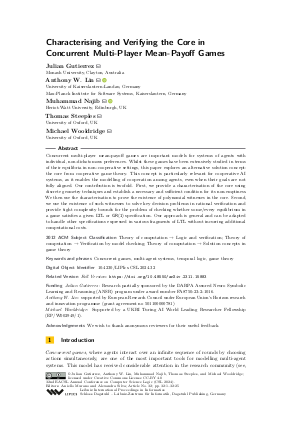@InProceedings{gutierrez_et_al:LIPIcs.CSL.2024.32,
author = {Gutierrez, Julian and Lin, Anthony W. and Najib, Muhammad and Steeples, Thomas and Wooldridge, Michael},
title = {{Characterising and Verifying the Core in Concurrent Multi-Player Mean-Payoff Games}},
booktitle = {32nd EACSL Annual Conference on Computer Science Logic (CSL 2024)},
pages = {32:1--32:25},
series = {Leibniz International Proceedings in Informatics (LIPIcs)},
ISBN = {978-3-95977-310-2},
ISSN = {1868-8969},
year = {2024},
volume = {288},
editor = {Murano, Aniello and Silva, Alexandra},
publisher = {Schloss Dagstuhl -- Leibniz-Zentrum f{\"u}r Informatik},
address = {Dagstuhl, Germany},
URL = {https://drops.dagstuhl.de/entities/document/10.4230/LIPIcs.CSL.2024.32},
URN = {urn:nbn:de:0030-drops-196752},
doi = {10.4230/LIPIcs.CSL.2024.32},
annote = {Keywords: Concurrent games, multi-agent systems, temporal logic, game theory}
}

 Creative Commons Attribution 4.0 International license
Creative Commons Attribution 4.0 International license


































